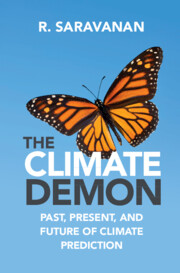Book contents
- The Climate Demon
- Reviews
- The Climate Demon
- Copyright page
- Dedication
- Contents
- Figures
- Preface
- Acknowledgments
- Introduction
- Part I The Past
- Part II The Present
- 8 Occam’s Razor
- 9 Constraining Climate
- 10 Tuning Climate
- 11 Occam’s Beard
- 12 The Hansen Paradox
- 13 The Rumsfeld Matrix
- 14 Lost in Translation
- 15 Taking Climate Models Seriously, Not Literally
- Part III The Future
- Glossary
- Notes
- Select Bibliography
- References
- Index
10 - Tuning Climate
A Comedy of Compensating Errors
from Part II - The Present
Published online by Cambridge University Press: 02 November 2021
- The Climate Demon
- Reviews
- The Climate Demon
- Copyright page
- Dedication
- Contents
- Figures
- Preface
- Acknowledgments
- Introduction
- Part I The Past
- Part II The Present
- 8 Occam’s Razor
- 9 Constraining Climate
- 10 Tuning Climate
- 11 Occam’s Beard
- 12 The Hansen Paradox
- 13 The Rumsfeld Matrix
- 14 Lost in Translation
- 15 Taking Climate Models Seriously, Not Literally
- Part III The Future
- Glossary
- Notes
- Select Bibliography
- References
- Index
Summary
The Leaning Tower of Pisa, used by Galileo to demonstrate the simplicity of science, is also a testament to the complexity of science. Over an 800-year period, multiple attempts were made to fix the errors in the tower’s construction that caused it to lean. Often, the fixes had unanticipated consequences, necessitating additional compensating fixes. Climate models face a similar problem. The models use approximate formulas called parameterizations, with adjustable parameters, to represent processes like clouds that are too fine to be resolved by the model grids. The optimal values of these parameters that minimize simulation errors are determined by a trial-and-error process known as “model tuning.” Tuning minimizes errors in simulating current and past climates, but it cannot guarantee that the predictions of the future will be free of errors. This means that models can be confirmed, but they cannot be proven to be correct.
Keywords
- Type
- Chapter
- Information
- The Climate DemonPast, Present, and Future of Climate Prediction, pp. 157 - 165Publisher: Cambridge University PressPrint publication year: 2021

